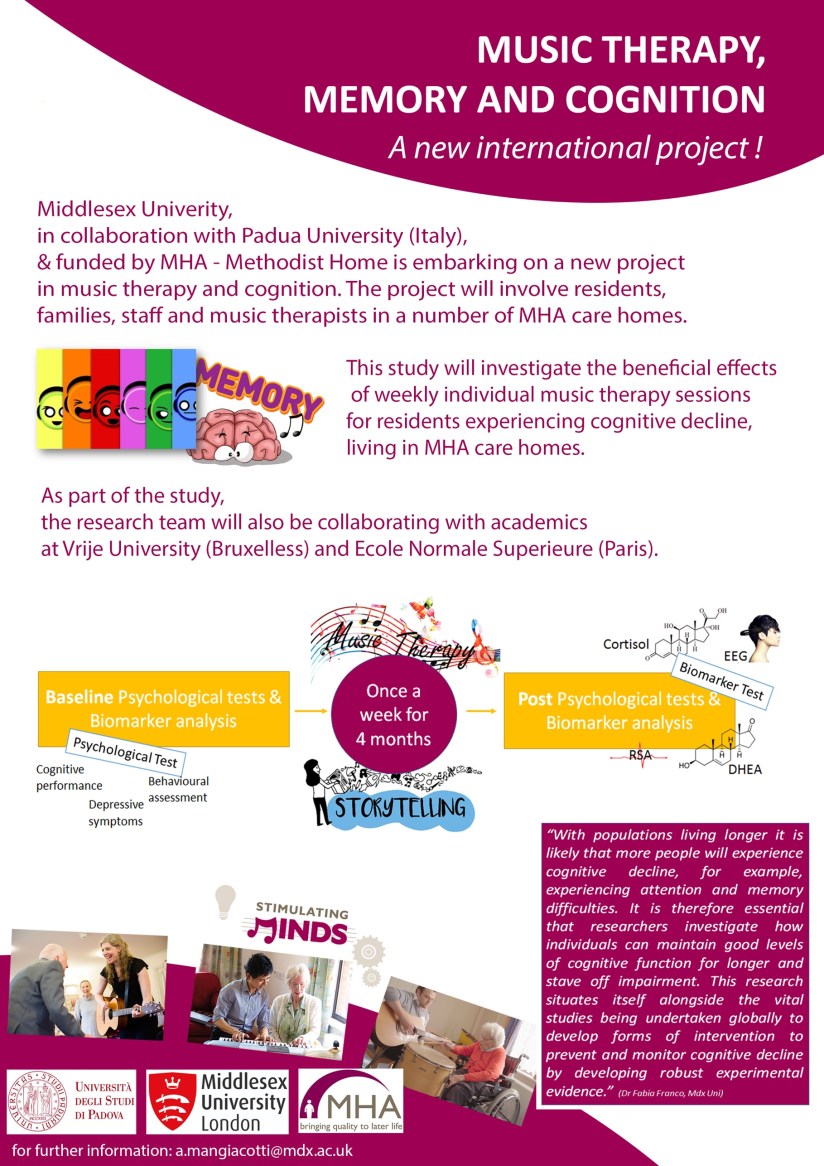Effects of Music Therapy in elderly care:
cognition, biomarkers, mood and social behaviour
(Mangiacotti, Biasutti & Franco in partnership with MHA)
Music therapy (MT) can provide significant benefits for people with cognitive decline living in care homes, helping them to enhance social-cognitive function & reducing behavioral symptoms (Zhang, 2017). Nevertheless, RCT studies that demonstrate the effectiveness of this intervention have often methodological flaws, with consequent significant limitations in the generalizability of this approach (see the reviews by Fusar-Poli, 2018; McDermott, 2013). In order to develop further studies aligned with the empirical approach, it appears crucial to present both clinical and scientific evidence, based on standardized tests, supported by biomarkers and implicit measures (psychophysiology, brain activity, saliva hormones), and developing protocols that could be replicable.
In order to fill this gap we are conducting a 4 months RCT study. We have recruited 43 elderly participants with mild to moderate cognitive impairment (MMSE between 18-23) living in 5 different MHA (Methodist Home Association) care homes in the UK.

In order to test the effectiveness of MT, we compare 2 groups: [1] the first group will attend one-to-one, 40 min once a week Music Improvisational Therapy activities, [2] the second group will attend one to one, 40 min once a week, Story Telling activities.
The story telling protocol was developed so as to match the use of improvisational techniques and the mood-matching approach (Franco et al., 2014) used in the MT activities.
Before and after the 4 months intervention we collect neuropsychological tests in order to assess the general cognitive level of the participants, complemented by a new neuropsychological test that we developed (currently under validation with a large sample) in order to assess the cognitive functions directly stimulated by musical interactions (Music Cognitive Test). Behavioural and wellbeing measurements were also used to assess psychiatry behavioural symptoms, mood, locus of control, motivation, life satisfaction and quality of fife.
Furthermore, in order to increase the empirical understanding of the impact of music therapy, we are also collecting measures of physiological regulation (Respiratory Sinus Arrhythmia, RSA), salivar Cortisol/DHEA ratio and EEG (Di Liberto, 2015), the latter within a feasibility study.
Results:
From the analyses of the neuropsychological tests and biomarker measurements, an improvement emerges over time for the music therapy group compared to the storytelling group. In particular, relating to the performance on cognitive tests, the music therapy group presents a significant improvement in general cognitive functions, executive functions in particular in reasoning, abstraction and cognitive flexibility, language, and in selective attentional abilities and psychomotor speed performances. On the other hand, the storytelling group shows a significant improvement only in the phonological verbal fluency test, remaining stable overall in the other tests.
From the hormones results, music intervention appears to be involved with steroid production. The cortisol and DHEA analyses revealed a significant improvement in the cortisol/DHEA levels (stress response) between the music therapy and storytelling group.
From the RSA preliminary results, a promising trend of music therapy to improve RSA value is shown. Music therapy seems to have parasympathetic influences, which could reflect a relaxation phenomenon in participants’ body.
Conclusion:
The present study demonstrated that sixteen sessions of one to one improvisational music therapy delivered over a four month period had a positive impact among older adults with mild to moderate cognitive decline, living in care home settings. Music therapy intervention proved useful to enhance cognitive functions, mood and wellbeing.
Reference:
Mangiacotti, A., Hsu, M. H., Barone, C., Di Liberto, G., Van Puyvelde, M., Biasutti, M., & Franco, F. (2019). P3‐465: EFFECTS OF MUSIC THERAPY IN ELDERLY CARE: COGNITION, BIOMARKERS, MOOD AND SOCIAL BEHAVIOUR. Alzheimer’s & Dementia, 15, P1144-P1144.


